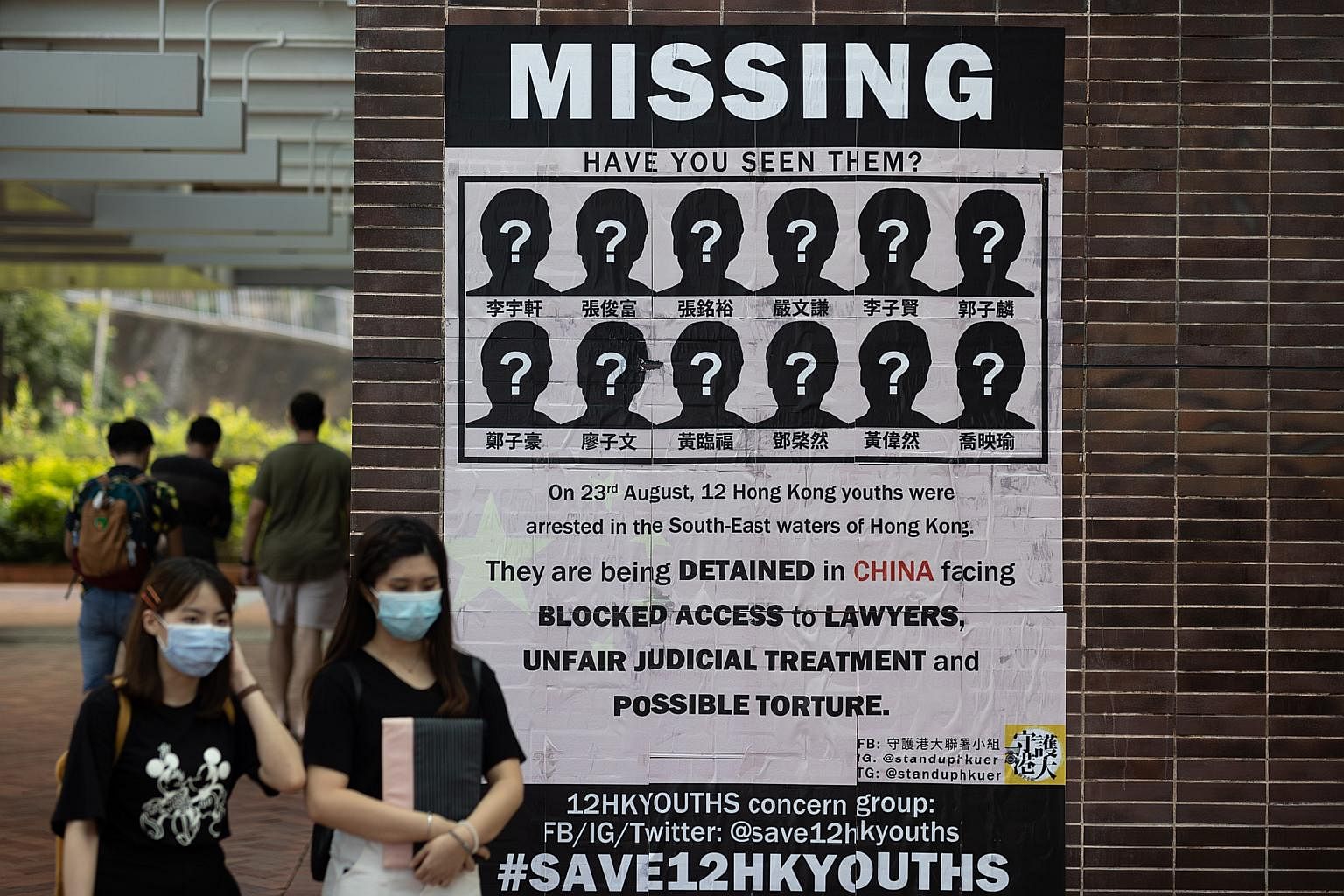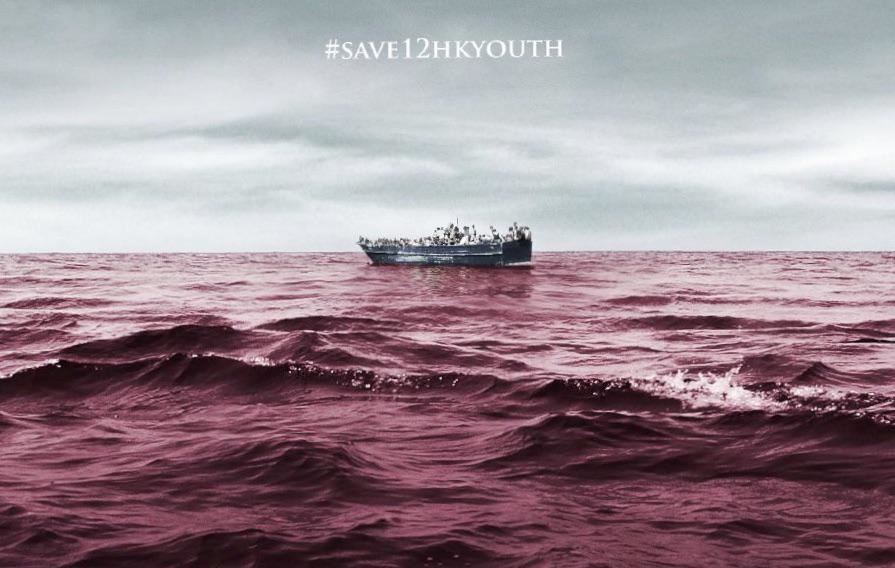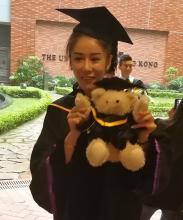EU citizen goes on trial, again, now in HK
Kok Tsz-lun, a Portuguese citizen, is facing another trial in Hong Kong after he was secretly tried and sentenced to seven-month imprisonment, largely incommunicado and without access to legal counsel, by China earlier. Still, Portugal is prepared to extradite yet another person to China, breaking with recent decisions around Europe to stop extraditions to the PRC.
Sometimes referred to as Tsz Lun Kok in Portuguese media, Kok Tsz-lun (郭子麟) is one of the #HK12, a group of 12 anti-extradition protesters who were captured and detained by the Guangdong province coast guard while fleeing Hong Kong for Taiwan by boat in August 2020.
Kok was a student at the University of Hong Kong and was merely 18 years old when he first participated in the demonstrations against Beijing’s attempts to enforce an extradition treaty between China and Hong Kong. As the police hardened the crackdowns with disproportional violence against protestors, many Hongkongers, including Kok, felt forced to leave as refugees.
Prolonged pretrial detention: a new norm in China
After being caught fleeing Hong Kong on August 23, 2020, Kok was placed into Yantian District Detention Centre in Shenzhen (深圳市盐田区拘留所), where he is believed to have been kept until his trial on December 29 later that year.
Facing accusations of illegal border crossing, all 12 Hong Kong activists were held in detention for 37 days before being formally arrested. Like in many other countries, standards dictate that before an official arrest police can only detain a suspect for up to 48 hours. However, according to a long list of ‘special exceptions’ under China’s Criminal Procedure Law, applicable only in ‘very difficult cases’, police can expand the detention of a suspect to a maximum of 37 days, without having any formal arrest warrant.
These exceptions, as with all exceptions in Chinese law, have become norm and are applied automatically, without review or need for justification.
Lawyers facing threats and defendants denied legal counsel
While awaiting trials, Kok and the others were denied access to lawyers. While Kok’s family had hired three lawyers, none of them were allowed to access and communicate with Kok or even access the case files. In addition, all three were disbarred shortly after their attempts to represent their client in full accordance with Chinese law.
For representing Kok and other ‘sensitive cases’, lawyers are subjected to reprisals from the authorities. Kok’s lawyer Lu Siwei had his license revoked on 15 January [2021] by the Department of Justice in Sichuan Province. Another lawyer Ren Quanniu, who has represented Zhang Zhan, a citizen journalist who was sentenced to four years in prison for reporting on the coronavirus outbreak in Wuhan, was also disbarred by the Department of Justice in Henan Province.
Lu and Ren said that “they were subjected to an unprecedented level of pressure throughout the four months they were involved with the Hong Kong defendants, including being urged to quit the case, told to refrain from speaking to the media and even had the premises of their law firms searched.” Both lawyers are charged with making comments that ‘have a negative impact on society’. Later, Lin Qilei, Kok’s third lawyer, who took over from Lu and Ren, was also disbarred not long afterwards.
Sadly, this is not a unique case, as “a third human rights lawyer involved in the defence of Hong Kong fugitives caught by the national coastguard” was “deregistered”, according to Jeffie Lam at South China Morning Post.
It is unknown when Kok’s verdict was delivered, as that was also done behind closed doors, but he and seven others were all sentenced to seven months in prison. Discounting time served in detention before trial, Kok was sent to Hong Kong on March 22, 2021, and immediately remanded into custody there.
Throughout Kok’s detention, arrest and later his trial in Shenzhen, he was denied visits by his Portuguese consular officials. Moreover, like many other countries’ diplomats who visited the court to attend the trial, the officials were forbidden from doing so, just as his family members. It was a secret trial. China yet again violated the international law governing consular access before and during trial.
 Credit: Deutsche Welle
Credit: Deutsche Welle
Portugal unwilling to protect its own citizen’s rights
Throughout this ordeal, whereas Member of European Parliament (MEP) Isabel Santos raised the issue in a resolution in the European parliament, making clear that the refusal to allow consular access, access to his lawyers and communication with his family, was in violation of the fundamental rights of the accused, the Portuguese government has largely wiped their hands of the case, despite pleas from Kok’s mother for their assistance.
Portugal’s embassy in Beijing confirmed that they were unable to communicate with their citizen throughout his detention, arrest, and trial, nor attend the actual trial. Furthermore, Beijing has refused to communicate with Portugal about their citizen, despite numerous attempts and attempts through using different channels. They also confirmed that they failed to engage in any direct communication with Kok at all. In fact, the only information about Kok that has, at any stage, been given, has been from the Hong Kong government.
As far as attempts by Kok’s mother to receive assistance from the Portuguese government, it fared no better. In fact, the Portuguese consulate in Hong Kong simply ignored her, despite her visiting them in person. Ms Santos herself requested the right to visit Kok in detention but was seemingly ignored in her request.
Portugal’s ambassador to China, José Augusto Duarte, said that "It's a diplomatic game that is delicate and requires a lot of patience and determination," saying “We follow our own methodology, which so far has been encouraging, in the hope that it is the best way to achieve what is most wanted", adding he found it key to ensure the handling did “not to create a controversy” that could risk closing dialogue. He later placed a benchmark of sorts, by saying about Portugal’s handling "I say with all humility that I have no guarantee on the final result”.
The final result of this approach is now well known: they were brushed aside, no consular access was given before or during trial, and in fact, for a long time, they were not even kept informed by China about the case.
Therefore, Kok, of course, was sentenced in a secret trial, kept incommunicado with no access to legal counsel, and later imprisoned. The Portuguese side have also, inexplicably, time and time again pointed to Kok’s dual citizenship, and often referring to him as a ‘passport holder’, seemingly doing the propaganda work of the Chinese government for them.
Using Mr Duarte’s benchmarks, we can conclude Portugal’s approach has been an abysmal failure. Which should surprise no one. Unfortunately, Portugal is unlikely to learn from this and adopt a new approach.

Credit: Fire at Sea (original), (reddit) u/Anything-Person/ (edited)
Portugal continues to fail its international obligations
Kok’s case merely demonstrates a major failure by Portuguese diplomats to protect the rights of their own citizen. As a signatory of international and European human rights treaties, Portugal is obliged to guarantee fundamental rights of all people residing in its territory, especially when considering extraditing anyone to a country where their basic rights may be violated. Despite the travesty that is the case of Mr Kok, Portugal continues to extradite people to China, and does so without even addressing legally binding commitments in the European Convention on Human Rights (ECHR): most recently, in a case which has now reached it end, but not yet executed, of 43-years-old Zhang Haiyan.
On January 20, 2022, European Parliament passed a resolution stating that it is “extremely concerned at attempts by Chinese authorities to target Hong Kong diaspora communities, including human rights defenders, in EU Member States; reiterates its call on the EU Member States to suspend active extradition treaties with the [People’s Republic of China] PRC and Hong Kong."
 Thus, it is surprising for Portugal to still extradite Zhang Haiyan to China after having witnessed how Kok, a Portuguese citizen, has been mistreated and deprived of his legal rights in China. It remains a mystery how Portugal’s courts - from first instance all the way up to the Constitutional court - could fail to take the actual behaviour within China’s judiciary into account - especially concerning an active case of a Portuguese citizen - the PRC’s continued violation of legally established rights of detainees in China, or violations of past diplomatic assurances or binding bilateral treaties that China maintains for consular access for foreign citizens in China.
Thus, it is surprising for Portugal to still extradite Zhang Haiyan to China after having witnessed how Kok, a Portuguese citizen, has been mistreated and deprived of his legal rights in China. It remains a mystery how Portugal’s courts - from first instance all the way up to the Constitutional court - could fail to take the actual behaviour within China’s judiciary into account - especially concerning an active case of a Portuguese citizen - the PRC’s continued violation of legally established rights of detainees in China, or violations of past diplomatic assurances or binding bilateral treaties that China maintains for consular access for foreign citizens in China.
During research on the case of Zhang Haiyan, Safeguard Defenders uncovered five more cases of extraditions between 2018 and 2020, all approved, without any assessment of torture, maltreatment, fair trial, or trustworthiness of Chinese 'assurances'.
The clear violation of Kok’s rights, in violation of both domestic- and international law, makes for grim comparison, and does not bode well for Zhang, a Chinese citizen who will have no such extra protections.
It should be noted that no court, at any level, in Portugal, addressed or assessed, in any way, how such an extradition would violate its legally binding commitments against torture and maltreatment, nor the right to a fair trial under European law, nor paid any attention to the myriad of violations of rights, including violations of diplomatic assurances by China, in what can best be viewed as a farce of a legal process.
After having been kept in custody in Hong Kong for some nine months, on 22 January this year Kok pleaded guilty to one count of rioting to have two other charges against him dropped. His trial was launched on April 12, where he faces seven years of imprisonment. On May 30 his defence will, as he has already pleaded guilty, present their mitigation request, after which, upon deliberation, a verdict is expected.
His initial lawyer, Chow Hang-tung, speaking to media, said that four of the eight returned to face prosecution in Hong Kong had managed to contact their families. When asked if all of them had managed to do so, she declined, citing worries to her as a legal practitioner if she were to answer. She referred to the police arrangement as police arrangement “mainlandised” and “politicised”, and also lashed out at the police for placing “unnecessary obstacles” between lawyers and their clients by refusing to identify the police stations where the fugitives were being held. “This certainly did not respect their right to meet their lawyers,” she added. Police had also conducted at least one interrogation without the suspect’s lawyer present.
Considering the outcome in other related trials and his guilty plea, Kok will with certainty be imprisoned again, this time in Hong Kong.
According to the Portuguese government's Internal Security report 2021 (Relatório anual de segurança interna 2021) there are currently four Portuguese citizens in detention in the PRC, and China extradited one person to Portugal 2021, which was one of 95 people Portugal received worldwide via extraditions, almost all others from within Europe. It deported a total of 80 people based on extradition requests the same year, almost all of them to other parts of Europe (all within the EWA - European Arrest Warrant system).
What Portugal should do
Portugal needs to shed its reputation as the weak underbelly of Europe, as far as its commitments to human rights protections go. Carrying out extraditions without due assessment of legally binding commitments also undermine the rule of law right here in Europe. We call on the Portuguese Ministry of Foreign Affairs to, as many other western nations, start issuing detailed country reports on China, to assess its development from a rule of law and human rights perspective, adherence to international- and relevant bilateral treaties, and the functioning of its criminal justice system.
Such country reports tend to be seen by both courts as well as administrative bodies (such as immigration boards) as the most authoritative information available, and due to the significant lack of knowledge about China, which also affects Europe in general, it is needed to allow the Portuguese legal system to defend Portugal’s commitment to the rule of law.
Portugal must, albeit belatedly, also follow other EU member states in suspending its extradition treaty to Hong Kong, done by all other EU member states except the Czech Republic, after it was called for by the European Council. Failure to adhere to stated EU policy is, at the moment, assisting China in sowing division in European policy, and again allowing Portugal to be played like a pawn. As the Czech Republic is likely moving towards suspending its treaty, it is high time for Portugal to be ready to do the same, or remain the only country in not only the EU but Europe to maintain such.
See Safeguard Defenders factsheet on Extraditions and China here.